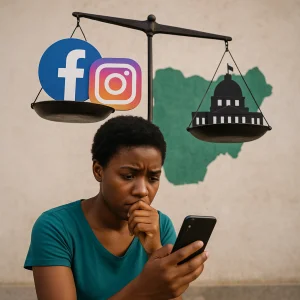
Meta's warning to quit Nigeria over new digital rules isn't just about compliance—it's a clash between global tech power and national control. The proposed law could reshape how Nigerians speak, sell, and socialise online. Millions use Facebook and Instagram not just for updates but also to run businesses and connect with the world. If Meta pulls out, it won't be just Silicon Valley that takes the hit—it'll be ordinary Nigerians.
So, what's going on - and what's at stake if Nigeria wins this power struggle?
Keep reading to uncover why this digital drama could echo far beyond Nigeria's borders.
Imagine waking up to find your business, built entirely on Instagram, gone overnight. That's the real fear behind Meta's threat to pull Facebook and Instagram out of Nigeria. But this isn't just a tech story. It's about power, control, and the shape of Nigeria's digital future.
A proposed Nigerian law, disguised as a regulation, could give the government sweeping control over online platforms. Meta, like other global tech firms, is pushing back. But the bigger picture isn't just about who wins this standoff—it's about what Nigerian voices might be silenced in the process.
What's Behind the Clash?
Nigeria's Code of Practice for Interactive Computer Service Platforms/Internet Intermediaries is at the heart of the dispute, developed by the National Information Technology Development Agency (NITDA). It demands platforms like Facebook and Instagram:- Take down content that the government deems harmful or offensive
- Store user data locally
- Register in Nigeria and have local representatives
- Cooperate with law enforcement when requested
What's Meta Saying?
Meta hasn't made threats lightly. The company has resisted similar moves in Kenya, Uganda, and India. Their position is that overbearing local laws risk fragmenting the open internet, making it harder for platforms to function consistently across borders.
By threatening to shut down operations in Nigeria, Meta is signalling that it will not comply with laws it sees as compromising user privacy or platform integrity.
But Meta's power move raises a question: is this principled resistance—or corporate arrogance?
Who Pays the Price?
While tech giants and governments trade power plays, ordinary Nigerians could be caught in the fallout.
Platforms like Facebook and Instagram are not just tools but essential infrastructure for small businesses, digital creators, activists, and even informal workers. Losing access could set back digital progress for a generation.
Beyond commerce, there's a more profound concern: freedom of expression. In a country where traditional media is already under pressure, social media remains one of the few spaces for open dialogue, activism, and dissent.
Nigeria Isn't Alone — And That's the Point
This isn't just a Nigerian problem. Across Africa, governments are asserting more control over tech platforms. Kenya and Uganda have introduced laws that have similar surveillance and data localisation demands. Globally, the balance between national control and digital openness is shifting.
Nigeria's decisions could set a precedent. If Meta concedes, other platforms might follow suit. If Nigeria enforces its law regardless, it could encourage more African nations to tighten digital control.
Either way, it's not just about one law or one company—it's about how African countries shape their digital futures in a world dominated by foreign platforms.
What Happens Next?
- Meta could follow through with its threat if the Nigerian government presses ahead. But it's a risky gamble. A full exit would hurt Meta's regional presence and cause economic and social disruption for millions of Nigerians.
- Could a compromise be possible—more nuanced policies that protect sovereignty without undermining rights or livelihoods?
- And deeper still: Shouldn't Nigerians be part of this conversation, not just subjects of it?
Whatever happens next, one thing is clear: this isn't just a fight between tech and government. It tests whose voices matter online—and who gets left out.




